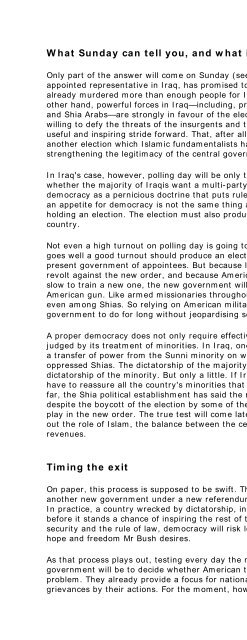The Economist - January 29th, 2005
The Economist - January 29th, 2005
The Economist - January 29th, 2005
Create successful ePaper yourself
Turn your PDF publications into a flip-book with our unique Google optimized e-Paper software.
What Sunday can tell you, and what it can't<br />
Only part of the answer will come on Sunday (see article). Abu Musab al-Zarqawi, al-Qaeda's selfappointed<br />
representative in Iraq, has promised to kill anyone who has the temerity to vote. He has<br />
already murdered more than enough people for Iraqis to know that this is no idle threat. On the<br />
other hand, powerful forces in Iraq—including, probably, an overwhelming majority of both Kurds<br />
and Shia Arabs—are strongly in favour of the election. If on polling day millions of people prove<br />
willing to defy the threats of the insurgents and turn out to vote, Iraq will indeed have taken a<br />
useful and inspiring stride forward. That, after all, is what happened in Afghanistan last October, in<br />
another election which Islamic fundamentalists had vowed to disrupt but which ended up by<br />
strengthening the legitimacy of the central government.<br />
In Iraq's case, however, polling day will be only the first of many tests. It will help to show<br />
whether the majority of Iraqis want a multi-party democracy or whether, like Mr Zarqawi, they see<br />
democracy as a pernicious doctrine that puts rule by men in place of the rule of God. But showing<br />
an appetite for democracy is not the same thing as acquiring one. That entails more than just<br />
holding an election. <strong>The</strong> election must also produce a government that is capable of running the<br />
country.<br />
Not even a high turnout on polling day is going to give Iraqis that sort of government soon. If all<br />
goes well a good turnout should produce an elected government with broader legitimacy than the<br />
present government of appointees. But because large parts of the Sunni heartland are in open<br />
revolt against the new order, and because America disbanded the old army and has been dismally<br />
slow to train a new one, the new government will still have to enforce its will at the point of an<br />
American gun. Like armed missionaries throughout history, the Americans are not popular in Iraq,<br />
even among Shias. So relying on American military power will be a hard thing for any new<br />
government to do for long without jeopardising some of the legitimacy the election confers on it.<br />
A proper democracy does not only require effective government, freely chosen. It has also to be<br />
judged by its treatment of minorities. In Iraq, one consequence of Sunday's election is sure to be<br />
a transfer of power from the Sunni minority on which Saddam built his power to the longoppressed<br />
Shias. <strong>The</strong> dictatorship of the majority is arguably a little less odious than the<br />
dictatorship of the minority. But only a little. If Iraq is to cohere as a single state, the Shias will<br />
have to reassure all the country's minorities that they can thrive under the new dispensation. So<br />
far, the Shia political establishment has said the right things. It promises to work with Sunnis<br />
despite the boycott of the election by some of their parties, and plays down the part religion will<br />
play in the new order. <strong>The</strong> true test will come later, when it is time to write a constitution that sets<br />
out the role of Islam, the balance between the centre and the provinces, and the sharing of oil<br />
revenues.<br />
Timing the exit<br />
On paper, this process is supposed to be swift. <strong>The</strong> present plan calls for the election of yet<br />
another new government under a new referendum-approved constitution by the end of this year.<br />
In practice, a country wrecked by dictatorship, invasion and insurgency will take much longer<br />
before it stands a chance of inspiring the rest of the Arab world. Until and unless legitimacy brings<br />
security and the rule of law, democracy will risk looking weak and ineffectual, not the source of<br />
hope and freedom Mr Bush desires.<br />
As that process plays out, testing every day the mettle of democracy, the trickiest task for a new<br />
government will be to decide whether American troops are still a solution or have become a<br />
problem. <strong>The</strong>y already provide a focus for nationalist insurgents, as well as daily providing new<br />
grievances by their actions. For the moment, however, the answer has to be that they should



